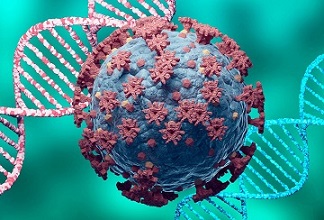MUST READ! Study Proposes Role Of SARS-CoV-2 Spike Protein, Stem Cells And Retrotransposons In Long-COVID Syndrome
Thailand Medical News Team Aug 16, 2023 2 years, 6 months, 1 week, 21 hours, 9 minutes ago
Study proposes that SARS-CoV-2 Spike protein causes retrotranspositioning in stem cells leading to altered gene expression, disruptions in stem cell differentiation, and persistent tissue damage that contribute to Long COVID!
COVID-19 News: The COVID-19 pandemic, caused by the severe acute respiratory syndrome coronavirus 2 (SARS-CoV-2), initially emerged as a respiratory illness, but its impact has proven to be far more intricate and profound. A growing body of evidence has pointed towards the SARS-CoV-2 spike protein as a key player in the development of Long-COVID syndrome, a condition characterized by persistent and often debilitating symptoms that extend beyond the acute phase of infection. This study by researchers from SG Giuseppe Moscati Hospital-Italy, University of Bari “Aldo Moro”-Italy, Phan Chau Trinh University of Medicine-Vietnam and Lincoln University, Multidisciplinary Research Center, Oakland-USA delves into a novel hypothesis that sheds light on the underlying mechanisms of Long-COVID, focusing on the interplay between the spike protein, stem cells, and retrotransposons.
 Credit: Gilnature/Getty Images/iStockphoto
The Spike Protein's Role in Long-COVID
Credit: Gilnature/Getty Images/iStockphoto
The Spike Protein's Role in Long-COVID
The spike protein of SARS-CoV-2 is a critical component that facilitates viral entry into host cells through binding to angiotensin-converting enzyme 2 (ACE2) receptors. While its initial role in infection is well-established as validated in past studies and
COVID-19 News reports, emerging evidence suggests that the spike protein might also be implicated in the lingering symptoms observed in Long-COVID. Reports of severe neurological, cardiovascular, and immunological manifestations in Long-COVID patients have prompted researchers to explore alternative pathways through which the spike protein might exert its effects beyond the acute phase of infection.
Retrotransposons: Unveiling the Mechanism
At the heart of this intriguing hypothesis lies the concept of retrotransposons, genetic elements that have long been overlooked in the context of viral infections. These elements, particularly LINE-1 (L1) retrotransposons, constitute a substantial portion of the human genome and have the capacity to integrate RNA molecules into genomic DNA. Contrary to the prevailing belief that only retroviruses can mediate this process, recent research has unveiled the ability of L1 retrotransposons to integrate RNA into the genome.
The proposed mechanism suggests that the spike protein's mRNA, which is present even in the absence of active viral replication, could integrate into the host cell's DNA through reverse transcription mechanisms driven by L1 retrotransposons. This process, known as retrotransposition, creates a unique environment within the cell, potentially leading to altered gene expression, disruptions in stem cell differentiation, and persistent tissue damage.
Stem Cells and Their Vulnerability
Stem cells play a pivotal role in tissue regenera
tion and repair. However, they also possess unique vulnerabilities that render them susceptible to the integration of foreign genetic material, such as viral mRNA. Pluripotent and multipotent stem cells have a more accessible genome compared to mature somatic cells, which makes them more amenable to the integration of exogenous genetic material. Furthermore, the reverse transcriptase enzyme present in stem cells might facilitate the uptake of microvesicles containing mRNA, potentially influencing mRNA expression and contributing to genomic instability.
The potential implications of stem cell involvement in this process extend beyond the individual, as viral spike protein mRNA could potentially be inherited via sperm RNA cargo, influencing the genetics of future generations. Telomeres, which are crucial for genome stability, share similarities with retrotransposons and might play a role in mediating this genetic interplay.
The Spectrum of Pathogenesis: Kidney, Heart, and Brain Axis
The proposed model of Long-COVID pathogenesis involves an intricate network of interactions, particularly focusing on the kidney/heart/brain axis. The renin-angiotensin system (RAS), which regulates autonomic and neuroendocrine functions, is intricately involved due to the widespread distribution of ACE receptors in various systems. Dysregulation of the RAS, triggered by the spike protein, may lead to chronic kidney disease, cardiovascular events, and neurologic symptoms.
Stem cells within this axis could contribute to the development of Long-COVID symptoms through altered differentiation and gene expression patterns. The spike protein's influence on sympathetic-afferent neurons and interneurons could explain the diverse and rapidly progressing symptoms observed in Long-COVID patients, ranging from cold extremities to muscle weakness and touch sensitivity.
Implications and Future Directions
The proposed hypothesis opens up a new avenue of investigation into the intricate mechanisms underlying Long-COVID syndrome. By integrating the fields of retrotransposons, stem cell biology, and viral pathogenesis, researchers can uncover novel insights into the persistent symptoms observed in COVID-19 survivors. Understanding the interplay between these elements could pave the way for the development of targeted therapeutic strategies that address the underlying causes of Long-COVID.
Conclusion:
In conclusion, the SARS-CoV-2 spike protein's interaction with stem cells and retrotransposons presents a compelling hypothesis for the pathogenesis of Long-COVID syndrome. This model sheds light on the intricate web of interactions that extend beyond the acute phase of infection, offering a fresh perspective on the lingering symptoms and long-term consequences of COVID-19. As research in this field progresses, a deeper understanding of these mechanisms could ultimately lead to more effective treatments for Long-COVID and related conditions.
The study findings were published on a preprint server and are currently being peer reviewed.
https://www.preprints.org/manuscript/202308.1130/v1
For the latest
COVID-19 News, keep on logging to Thailand Medical News.
Read Also:
https://www.thailandmedical.news/news/breaking-long-covid-is-a-misnomer-the-conditions-are-being-caused-by-viral-persistence-and-viral-peptides-similar-to-retrotransposons-and-introns
https://www.thailandmedical.news/news/there-is-no-such-thing-as-long-covid-sars-cov-2-exposure-causes-persistent-infections-along-with-continuous-presence-of-short-viral-rnas-svrnas
